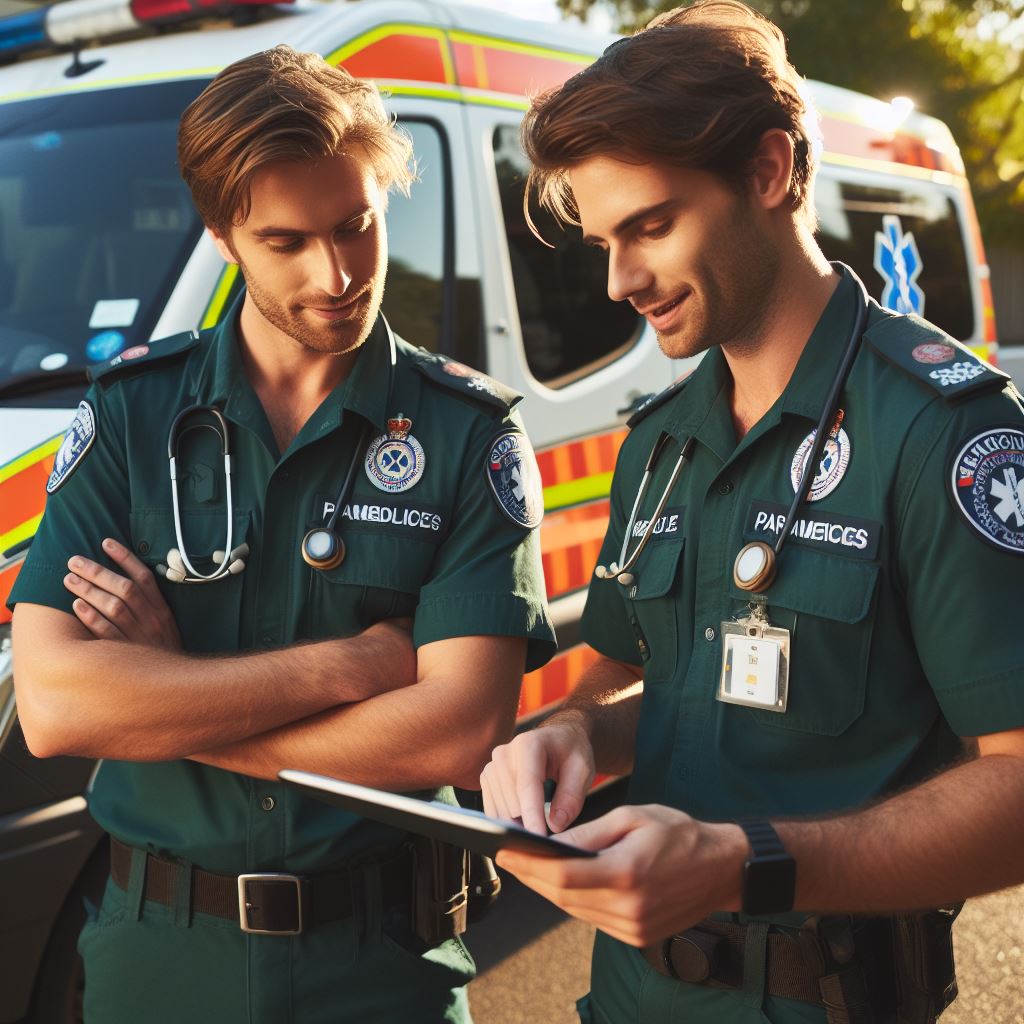Introduction
In setting the stage for our discussion, we plunge into the world of Aussie paramedics facing challenges amid emergency scenes.
It’s imperative to recognize the gravity of these hurdles, as it directly impacts the efficiency and effectiveness of emergency medical responses.
From navigating unpredictable situations to managing high-pressure environments, paramedics in Australia encounter multifaceted challenges daily.
This blog aims to unravel the intricacies of these scenarios, shedding light on the demanding nature of their profession.
By delving into the challenges faced on the frontline, we gain a deeper understanding of the resilience and skill set required in the demanding field of emergency medical services in Australia.
Get set for an insightful exploration of the challenges faced by Aussie paramedics in emergency scenes.
This study will emphasize the importance of acknowledging and addressing these hurdles for better emergency healthcare.
Overview of the Role of Paramedics in Australia
In Australia, paramedics play a vital role in providing emergency medical care to those in need.
They are the first responders in critical situations and are responsible for delivering life-saving interventions.
Responsibilities and Tasks
- Responding promptly to emergency calls and providing immediate medical assistance.
- Assessing patients’ conditions and making critical decisions regarding their treatment.
- Administering medications, conducting medical procedures, and managing patients’ airways.
- Stabilizing patients and preparing them for transport to healthcare facilities.
- Collaborating with other healthcare professionals, such as doctors and nurses, to provide comprehensive care.
- Documenting all interventions and coordinating with hospitals to ensure seamless care continuity.
- Responding to non-emergency medical calls and providing necessary patient care and assessment.
Qualifications and Training
Becoming an Australian paramedic requires specific qualifications and extensive training to ensure competency and the ability to handle high-pressure scenarios.
- Completion of a bachelor’s degree in paramedicine or an equivalent qualification.
- Obtaining a valid driver’s license and a clear driving record.
- Undertaking on-the-job training through internships or clinical placements.
- Obtaining certification in First Aid/CPR and Advanced Life Support (ALS).
- Participating in continuous professional development programs to update their skills and knowledge.
- Passing national competency exams, including written and practical assessments.
- Registering and maintaining registration with the Australian Health Practitioner Regulation Agency (AHPRA).
Challenges which paramedics in Australia are constantly faced with
Paramedics in Australia are constantly faced with various challenges that require quick thinking and effective decision-making.
- Encountering life-threatening situations that demand immediate and accurate assessment.
- Navigating complex and unpredictable emergency scenes while ensuring personal safety.
- Dealing with emotionally charged situations and providing reassurance to patients and their families.
- Working extended hours and being adaptable to changing schedules and demanding work environments.
- Remaining calm and composed under extreme pressure to provide optimal patient care
Need for strong communication and interpersonal skills
Australian paramedics must possess strong communication and interpersonal skills to effectively interact with patients, their families, and other healthcare professionals.
- Ensuring clear and concise communications with dispatchers and medical control centers.
- Empathizing with patients and reassuring them during times of distress or pain.
- Facilitating effective handovers to hospital staff, providing accurate patient histories and intervention details.
- Working collaboratively with colleagues in a team-based environment.
As the demand for emergency medical services increases, the role of paramedics in Australia continues to evolve.
They are becoming more involved in community health initiatives, proactively educating the public, and promoting injury prevention.
Paramedics also assist in disaster management and contribute to research to advance pre-hospital care.
In essence, paramedics in Australia are skilled professionals who provide essential healthcare services in critical situations.
Their training, qualifications, and dedication enable them to save lives and ensure the wellbeing of individuals and communities.
Read: Cultural Competence in Australian Medicine
The demanding nature of emergency scenes
The demanding nature of emergency scenes can put paramedics in high-pressure environments where every second counts.
The high-pressure environment paramedics face
Paramedics face intense pressure and stress as they navigate emergency situations, making split-second decisions that can mean the difference between life and death.
The physical and mental challenges encountered by paramedics
Physically, paramedics are often required to carry heavy equipment and run long distances to reach patients quickly.
They must be physically fit and able to handle the demands of the job, including lifting and transporting patients in challenging conditions.
Mentally, paramedics must remain calm and composed amidst chaotic scenes. They encounter distressed patients, grieving family members, and traumatic injuries on a regular basis.
They must be able to think clearly and rationally, assessing the situation and determining the appropriate course of action.
Your Personalized Career Strategy
Unlock your potential with tailored career consulting. Get clear, actionable steps designed for your success. Start now!
Get StartedThe challenges faced by paramedics in emergency situations go beyond the physical and mental. They often work in high-stress environments where they are constantly exposed to traumatic events and situations.
This can lead to compassion fatigue and burnout, as the emotional toll of the job can take a significant toll on paramedics’ well-being.
Paramedics also face challenges in communication and teamwork.
They must work effectively with a wide range of healthcare professionals, emergency services personnel, and support staff to ensure seamless coordination and efficient care for patients.
Effective communication is crucial in these high-pressure situations, as any miscommunication can result in delayed or inadequate care.
Another challenge that paramedics face is the unpredictability of emergency scenes. They never know what they will encounter when they respond to a call.
Each emergency situation is unique, requiring paramedics to quickly adapt to the circumstances and make critical decisions on the spot.
How to curb the challenges
To cope with these challenges, paramedics undergo rigorous training and continuous professional development to enhance their skills and knowledge.
They learn techniques for managing stress, practicing self-care, and seeking support when needed.
Many paramedics also rely on their colleagues for peer support, as they understand the unique pressures of the job.
Despite the challenges, paramedics find fulfillment in their work.
They have the opportunity to make a significant difference in people’s lives, providing life-saving care and support during some of the most vulnerable moments.
Their dedication and resilience in the face of immense pressure are truly remarkable.
Basically, the demanding nature of emergency scenes presents paramedics with high-pressure environments where they must navigate physical, mental, and emotional challenges.
Despite the difficulties, they exemplify professionalism and dedication in providing critical care to those in need. Paramedics are true heroes, deserving of our utmost respect and appreciation.
Read: Impact of AI on Australian Healthcare
Lack of resources and equipment
In emergency scenes, paramedics often face challenges due to a lack of resources and equipment. These limitations can have a significant impact on patient care, posing various challenges for paramedics.
Inadequate resources
Inadequate resources such as ambulances, medical supplies, and personnel can seriously hinder the effectiveness of paramedics.
Without enough ambulances, response times may be delayed, endangering patients’ lives.
Insufficient medical supplies and equipment
These restrict paramedics from providing necessary interventions, potentially worsening patient conditions.
Lack of life-saving medications and specialized equipment can limit their ability to stabilize patients in critical situations.
Limited personnel
This is a significant issue as emergencies require a team of professionals to handle complex cases.
In scenarios where paramedics are understaffed, they may struggle to provide optimal care to every patient, compromising their well-being.
The impact of inadequate resources and equipment on patient care
The impact of inadequate resources and equipment on patient care is undeniable. Delayed response times and limited interventions can lead to worsened health outcomes, exacerbating injuries or medical conditions.
Challenge of prioritizing patients due to limited resources
Paramedics often face the challenge of prioritizing patients due to limited resources.
They have to make tough decisions regarding who receives immediate care, potentially leaving others in a vulnerable state until additional resources arrive.
Reliance on makeshift solutions or improvisation
In some cases, paramedics might need to rely on makeshift solutions or improvisation due to the lack of specific equipment.
While they may use their expertise to compensate, this can add an additional layer of risk to patient care.
Stand Out with a Resume That Gets Results
Your career is worth more than a generic template. Let us craft a resume and cover letter that showcase your unique strengths and help you secure that dream job.
Get HiredMental health challenges
Lack of resources can also affect paramedics’ mental well-being.
The stress of working with limited equipment and resources can lead to burnout and decreased job satisfaction, which may impact their performance in the long run.
Rural limitations
In rural or remote areas, where resources are already limited, paramedics face even more significant challenges.
Distance, difficult terrain, and lack of nearby medical facilities further impede their ability to provide prompt and adequate care.
Impact on overall healthcare system
Insufficient resources also impact the overall healthcare system, as hospitals become overwhelmed with patients due to delayed or compromised pre-hospital care.
This places an additional burden on already strained healthcare services.
How to address the limitations
Improvement of Resources and Equipment
Governments and healthcare organizations should invest in improving resources and equipment for paramedics.
This includes increasing the number of ambulances, medical supplies, and personnel available in emergency response systems.
Adequate training and ongoing education
Adequate training and ongoing education for paramedics are also vital to ensure they can adapt to challenging situations when resources are limited.
This could involve training them on alternative techniques or equipping them with additional skills.
Collaborations
Collaboration between healthcare providers, governments, and the community is essential in addressing the challenges posed by inadequate resources.
By working together, it is possible to allocate resources more efficiently and improve patient care in emergency scenes.
In review, the limitations faced by paramedics due to inadequate resources and equipment in certain emergency scenes have a significant impact on patient care.
The challenges posed by these limitations require attention and action from relevant authorities to ensure optimal care for those in need.
Read: Continuing Education for Doctors in Aus

Dealing with trauma and emotional stress
Emergency scenes can have a significant emotional toll on paramedics and affect their mental well-being.
Emotional toll on paramedics
- The constant exposure to traumatic events can lead to post-traumatic stress disorder (PTSD).
- Paramedics witness intense suffering, death, and devastation, which can cause emotional distress.
- Witnessing the pain and grief of patients’ families can be emotionally overwhelming.
- Emergency scenes can trigger a range of emotions such as sadness, anger, helplessness, and guilt.
- Paramedics often experience compassion fatigue due to the immense emotional demands of their job.
Strategies used by paramedics to cope
- Peer support programs provide a safe space for paramedics to share their feelings and experiences.
- Regular debriefings with colleagues help paramedics process their emotions and reduce emotional burden.
- Psychological interventions and counseling services are available to paramedics for professional support.
- Paramedics are encouraged to engage in self-care activities like exercise, hobbies, and spending time with loved ones.
- Developing a resilience mindset through training helps paramedics better manage stress and emotional challenges.
- Meditation and relaxation techniques can help paramedics relax their minds and reduce anxiety.
- Paramedics are trained to detach emotionally from situations while still providing necessary care.
- Establishing a strong support network outside of work can provide paramedics with additional emotional support.
- Reflective practice, such as writing journals or participating in therapy, allows paramedics to process their emotions.
- Paramedics undergo regular mental health check-ups to identify and address any signs of emotional distress.
It is crucial for paramedics to prioritize their emotional well-being as it directly impacts their ability to provide effective emergency care.
By implementing strategies to cope with trauma and emotional stress, paramedics can better navigate the challenging nature of their profession and continue to save lives.
Read: Mental Health Support for Doctors in Oz
Delve into the Subject: COVID-19 Impact on Public Health Jobs
Learn More: Surgeon Burnout: Addressing the Issue
Navigating Challenging Working Conditions
Difficulties encountered by paramedics
Working as a paramedic in Australia can be incredibly demanding and challenging, especially when it comes to navigating difficult working conditions.
Transform Your LinkedIn for Maximum Impact
Elevate your professional brand with a LinkedIn profile that attracts recruiters, showcases your expertise, and maximizes opportunities. Stand out in your industry with a profile built for success.
Boost ProfileChallenges associated with remote locations
Paramedics often find themselves in remote locations or extreme weather conditions, posing various challenges that they must overcome to provide prompt and efficient care to those in need.
Working in remote locations presents its own set of difficulties. Paramedics often have to travel long distances to reach patients, which can delay their response times.
These remote areas may lack proper infrastructure and medical facilities, making it harder for paramedics to provide immediate care.
They must rely on their skills and experience to stabilize patients until they can be transported to a hospital.
Challenges associated with extreme weather conditions
Extreme weather conditions also add to the challenges faced by paramedics. Australia is known for its vast and diverse landscapes, ranging from scorching deserts to freezing mountain ranges.
Paramedics must be prepared to work in these extreme environments and adapt quickly to the changing weather conditions.
For example, in the northern regions, paramedics often face the heat and humidity that can be physically exhausting while treating patients.
Specific challenges faced in different Australian regions
In addition to remote locations and extreme weather, specific challenges vary across different Australian regions.
In rural areas, where access to medical care is limited, paramedics often find themselves as the first responders to emergencies.
They must possess a wide range of medical skills and knowledge to handle diverse cases until more advanced help arrives.
Coastal Regional Challenges
Coastal regions pose unique challenges for paramedics as well.
With frequent water-related incidents such as drowning or surfing accidents, paramedics must be adept at performing water rescues and administering critical care in these situations.
They must also be prepared to handle marine life encounters, such as jellyfish stings or shark attacks, which require specialized knowledge and skills.
Australian Outback
In the Australian outback, paramedics face the challenges of vast distances and limited resources. They may have to travel for hours, often by helicopter, to reach patients in need of medical attention.
They must carry advanced medical equipment and supplies to provide essential care in these remote areas.
Bushfire Seasons
During bushfire seasons, paramedics face elevated risks and difficulties. They must navigate through smoke-filled areas while managing the health and well-being of affected individuals.
The threats posed by wildfires, including burns and smoke inhalation, require paramedics to be prepared for specialized treatments and varied injuries.
Despite these daunting challenges, Australian paramedics remain dedicated to providing life-saving care.
They continuously train and equip themselves with the necessary skills and knowledge to handle any situation they may encounter. Their commitment to serving and saving lives is commendable.
Ultimately, paramedics in Australia face numerous challenges in their line of work.
Navigating remote locations, extreme weather, and specific difficulties in different regions require them to be resilient, adaptable, and highly skilled professionals.
Their commitment and determination contribute significantly to the health and well-being of Australians in need, making them unsung heroes of the emergency scenes.
See Related Content: How to Become a Public Health Expert in Oz
You Might Also Like: Aussie Paramedics: Dealing with Trauma
Collaboration with other emergency services
Importance of teamwork and collaborations
Collaborating with other emergency services is crucial for paramedics in handling complex emergency scenes. Teamwork and coordination are paramount.
- Effective collaboration ensures a seamless response to emergency situations, pooling resources and expertise.
- Paramedics work closely with firefighter teams, who assist in rescuing victims and providing immediate medical support.
- Police services play a significant role in managing crowd control and ensuring scene safety, allowing paramedics to focus on medical assistance.
- The communication between paramedics and other emergency services enhances information exchange, enabling a quick and coordinated response.
- In complex scenes, such as natural disasters or major accidents, collaboration is even more critical due to increased casualties.
- Coordinating efforts among multiple teams becomes challenging as each service has its own protocols and priorities.
- Paramedics must establish strong lines of communication with other emergency services to avoid confusion and provide effective care.
- Clear and concise communication becomes essential in chaotic scenes, guiding the teamwork and ensuring everyone knows their role.
- Time is of the essence in emergencies, and collaboration helps save valuable minutes, increasing the chances of successful outcomes.
- Collaborative drills and training sessions prepare paramedics to work seamlessly with other emergency services during crises.
- Developing mutual trust and understanding among emergency service personnel fosters efficient collaboration and enhances overall performance.
- The importance of collaboration extends beyond the actual emergency scene, as teams must also work together in post-event debriefings.
- Post-event assessments help identify areas of improvement and enhance future collaboration for better emergency response.
- Multi-agency information systems allow paramedics and other emergency services to share critical data and streamline operations.
- Collaborating with other services is also beneficial in terms of resource allocation, ensuring that each service has the necessary support.
Challenges faced in coordinating efforts during complex emergency scenes
- Paramedics may require additional assistance from specialized units, such as hazardous materials teams or search and rescue teams.
- Collaboration enables paramedics to tap into the expertise and experience of other emergency services, enhancing overall patient care.
- Building strong relationships between paramedics and other emergency services fosters a sense of trust and shared responsibility.
- The challenges of coordinating efforts with other services are not limited to organizational differences but may also include logistical constraints.
- Collaborative efforts in emergency scenes showcase the dedication and professionalism of all involved, working towards a common goal of saving lives.
Collaboration with other emergency services is a fundamental aspect of paramedic work.
Emphasizing teamwork importance and discussing challenges in coordinating efforts during emergencies ensures a more effective response, leading to better outcomes for those in need.
Conclusion
This blog post discussed the challenges faced by Aussie paramedics in emergency scenes.
Throughout the post, we highlighted the various obstacles and difficulties these paramedics encounter on a daily basis. It is evident that their job requires immense resilience and dedication.
Despite the chaos and unpredictability of emergency scenes, Aussie paramedics remain steadfast in their commitment to saving lives.
They navigate through challenging environments, delivering prehospital care under immense pressure.
They have to quickly assess situations and make critical decisions to provide the best possible care to patients.
Moreover, this blog post emphasized the importance of teamwork and communication amongst paramedics in emergency scenes.
It is evident that effective collaboration is crucial for successfully managing complex situations and ensuring the best outcomes for patients.
Aussie paramedics exemplify remarkable resilience and dedication in their efforts to overcome challenges in emergency scenes.
Through their unwavering commitment, they continue to save lives and provide vital care to those in need. Their courageous and selfless work should be acknowledged and celebrated.




